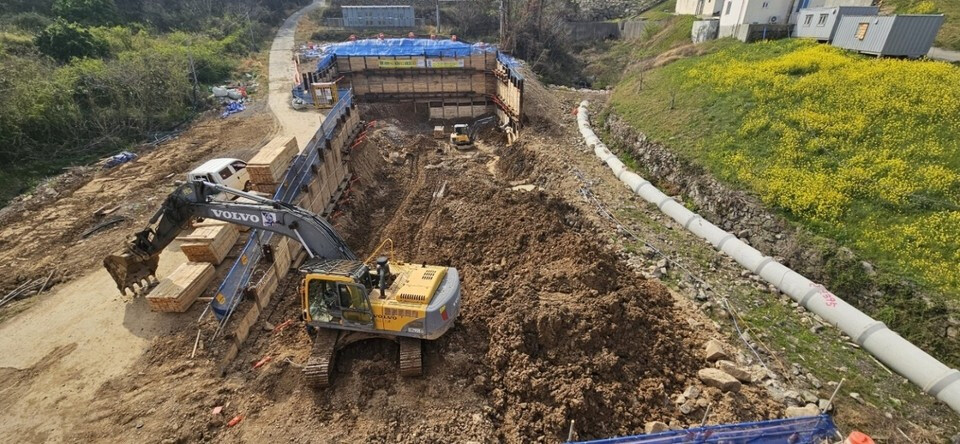
Jeju Special Self-Governing Province announced on April 17th its ongoing commitment to significantly improving the living environment and settlement conditions for residents of its key offshore islands, including Chuja-do, Gapa-do, Mara-do, Udo, and Biyang-do. The core objective of this ambitious undertaking is to address the pressing issues of potable water scarcity and wastewater management, exacerbated by a surge in tourism and the aging of existing infrastructure.
The Water and Wastewater Management Headquarters of Jeju Province is at the forefront of these efforts. Recognizing the strain placed on Chuja-do by increasing tourist numbers and the deterioration of its current facilities, the headquarters is actively pursuing the 'Chuja Water Purification Plant Seawater Desalination Facility Improvement and Expansion Project.' This substantial initiative, with a total budget of 26.996 billion KRW (approximately 19.5 million USD), including 18.897 billion KRW in national funds and 8.099 billion KRW in local funds, commenced in 2022 and is slated for completion by June 2026. The project involves the modernization of the existing facility, which has a daily capacity of 1,500 tons, and the addition of a new facility capable of producing 1,000 tons of water per day. Currently, the project is 13% complete, with foundational work and the installation of water conveyance pipelines underway.
Furthermore, to tackle the challenge of water supply vulnerability in the Muk-ri area of Chuja-myeon, a 'Rural Vulnerable Water Supply Area Improvement Project' is scheduled to be implemented between May and August of this year. This 113 million KRW (approximately 81,700 USD) project will involve the installation of 0.272 kilometers of new water supply pipelines, directly addressing the needs of residents facing inconsistent access to potable water.
Addressing wastewater management on Chuja-do is equally critical. To cope with the increasing tourist influx and the expansion of the wastewater treatment zone, the province is undertaking the 'Chuja-myeon Rural Village Sewage Treatment Project' from 2026 to 2028, with a significant investment of 15.118 billion KRW (approximately 10.9 million USD). This project aims to integrate and expand the existing small-scale treatment facilities and replace aging pipelines. The anticipated outcomes include a significant improvement in the local environment and the preservation of the water quality of public water bodies.
Similar efforts to enhance the stability of potable water supply are underway on the islands of Gapa-do and Mara-do, with active projects focused on the improvement and expansion of desalination facilities. The Gapa Desalination Plant is undergoing a 10 billion KRW (approximately 7.2 million USD) upgrade, involving the modernization of existing equipment (with a daily capacity of 300 cubic meters) and an expansion of an additional 300 cubic meters per day. The Mara Desalination Plant is receiving an 8.5 billion KRW (approximately 6.1 million USD) investment to modernize its existing facilities (currently 100 cubic meters per day) and add a new capacity of 200 cubic meters per day. Both projects are on track for completion by 2026, promising a more reliable water supply for the residents of these smaller islands.
Udo, which attracts approximately 1.5 million tourists annually, benefits from a 15.96-kilometer submarine pipeline (12.93 km onshore, 3.03 km offshore) originating from Sangdo-ri in Gujwa-eup. This crucial infrastructure currently supplies up to 2,000 tons of water per day to the island. Additionally, two 2,000-ton capacity water reservoirs on Udo ensure a stable distribution network. In 2023 alone, a total of 838,910 cubic meters of water was supplied to Udo, highlighting the importance of this underwater pipeline.
Biyang-do, connected to Hyeopjae-ri in Hallim-eup by a submarine pipeline (D100mm), has faced persistent challenges despite previous improvement and repair works. Issues such as leaks and reduced water pressure have affected the reliability of the water supply. To address these long-standing problems, the Water and Wastewater Management Headquarters has allocated 10.6 billion KRW (approximately 7.6 million USD) for the 'Biyang-do Submarine Pipeline Expansion and Old Pipeline Replacement Project,' scheduled from 2024 to 2026. Upon completion, this project is expected to provide a more stable and consistent water supply to the 186 residents and numerous tourists who visit Biyang-do.
In a move towards smarter and more efficient management of wastewater infrastructure, Jeju Province is also implementing the 'Island Region Small-Scale Public Sewage Treatment Facility Smart Integrated Remote Management System Construction Project,' selected as a pilot project by the Ministry of Environment. A total of 7.886 billion KRW (approximately 5.7 million USD) is being invested in this initiative, which will equip 13 small-scale sewage treatment facilities across Chuja-do, Udo, Biyang-do, Gapa-do, and Mara-do with smart technology for remote monitoring. The project, slated for completion in December of this year, is anticipated to significantly improve the real-time remote management of these facilities, enhance the quality of treated effluent, and ensure greater stability in wastewater treatment processes across the islands.
Jwa Jae-bong, head of the Water and Wastewater Management Headquarters, emphasized the province's unwavering commitment to enhancing the living environment of island residents and realizing practical water welfare. "We will continue to exert our utmost efforts in expanding the water and wastewater infrastructure to ensure a better quality of life for the residents of our offshore islands," he stated.
This comprehensive initiative underscores Jeju Province's dedication to sustainable development and the well-being of its island communities. By strategically investing in crucial infrastructure, the province aims to not only address the immediate challenges posed by tourism and aging facilities but also to lay a solid foundation for the long-term prosperity and resilience of these unique and valuable parts of Jeju. The integration of smart technology in wastewater management further highlights the province's commitment to innovation and environmental stewardship in its pursuit of a higher quality of life for all its residents, including those in its most remote locales.
[Copyright (c) Global Economic Times. All Rights Reserved.]



























